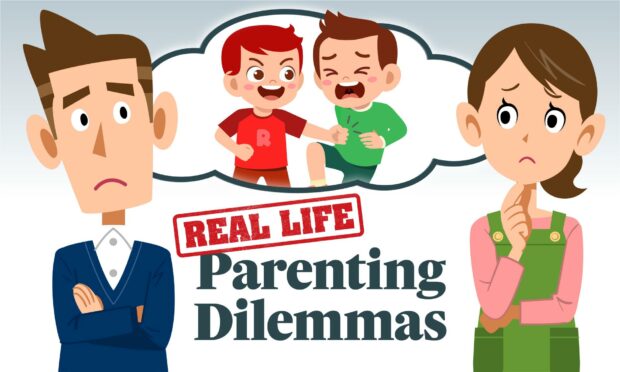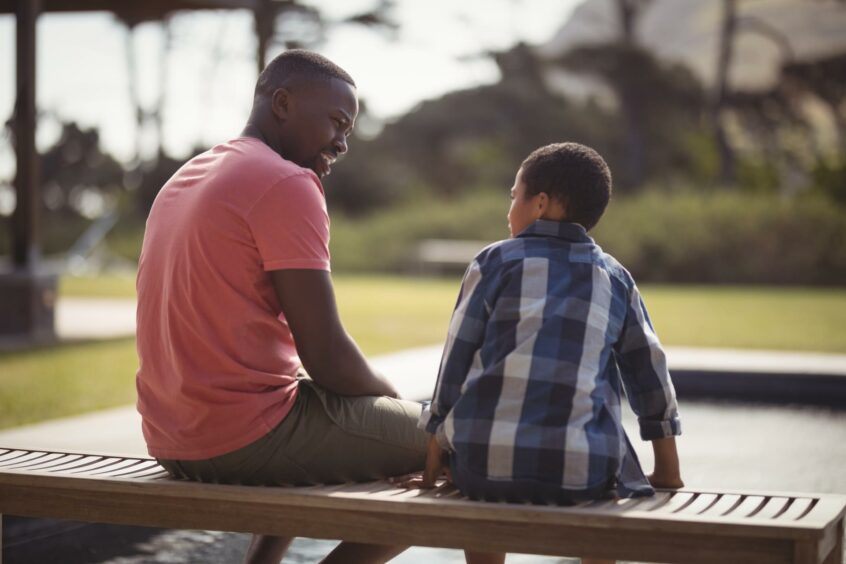There are a million ways a bully can make you miserable.
They can punch, scratch, call names, leave nasty comments online. And the effects are just as varied: the pounding heart, the anxiety attacks, the self-doubt or even self-harm.
They can turn school from a fun place full of friends and new experiences into a gauntlet of social anxiety.
Bathrooms become hiding places, but sometimes even that isn’t safe.
Despite the many forms it takes, experts agree there is one truth about bullying: no-one deserves it.
So when you find out your child is dealing with a bully at school, your instinct may be to leap into action.
But we sat down with experts and kids who said that a parent with good intentions can make things worse before they get better.
How does bullying impact children and what are the signs?
Research shows that one-third of Scottish children are bullied, but that number is likely to be higher because of unreported or unrecognised incidents.
If your child is anything like I was, then getting a response to “How was your day?” is like pulling teeth.
I wasn’t great about sharing the good things that happened.
Opening up about difficult feelings was out of the question.
Mya, from Elrick Primary, feels the same way
“If I was getting bullied, I would probably find it hard and a bit embarrassing to talk about it.”
But how do you know when a child is dealing with bullies at school? If they are dealing with bullies, your child might:
- Become withdrawn or quiet
- Take a different path to school
- Avoid certain clubs or favourite activities
- Have a shorter emotional fuse
- Look for excuses to stay home
When a child is the victim of bullying or harassment, they tend to feel out of control.
And having that sense of control is key to good mental health and childhood development.
Katie Rafferty, director of respectme, Scotland’s anti-bullying service, said that bullying behaviours can erode that sense of control.
In order to help prevent long term effects, it’s important to return some control quickly.
“What we know about bullying is that it strips away from a child their sense of control and sense of agency. That feeling that a child actually has a say in what happens to them.
“When that is lost, that is why we see such significant and possibly far-reaching implications for a young person’s mental health and wellbeing.”
So your child is dealing with bullies at school – what now?
There’s no sure-fire way to deal with a bully, but during that first conversation with your child, it’s important to keep a few things in mind:
- Check your emotions at the door – Your reaction shouldn’t get in the way and overshadow how your child is feeling.
- Listen – It’s important to paint a picture of what is happening and how your child feels about it.
- Ask first, act later – Try to find out what your child wants from you. By immediately offering ways you can get involved, you may leave them feeling even more out of control.
It’s nice to hope that your child will always have the maturity to know what’s best.
But you and your child won’t always see eye-to-eye on how to respond.
Katie said that, in situations where your duties as a parent clash with what your child wants, it’s important to explain yourself clearly.
“Of course, we’re going to have that duty of care as a parent or as a teacher, and sometimes we have to do things that perhaps the young person will disagree with.
“But as much as possible, do that in collaboration and get the young person to understand why.
“Hear their worries and their fears and try to put into place steps to alleviate them.”
Deal with bullies through communication
Because bullying stirs up so many emotions, Katie said that it’s important to keep a cool head when speaking to your child.
If you immediately start suggesting ways to deal with bullies at school, you may have a negative effect on your child, she said.
“That’s why we say it really is about having honest conversations with our young people. And often that means not waiting until there has been an incident.
“Keeping lines of communication open with our children and young people all the time so that they do know that they can come and speak to their parents and carers when anything is happening.”
Many children are hesitant to talk about their feelings. And many adults aren’t much better. That’s why Katie says it’s important to make a habit of having regular conversations with your child.
Spend time establishing open lines of communication even when things are good. That way, it will feel more natural for them to discuss difficult subjects like bullying or harassment.
Tips for a healthy conversation:
- Look for neutral ground – Don’t size each other up across the living room. Take a walk, play a game, or go somewhere where the conversation isn’t the only thing happening.
- Don’t push it – Your child might not be ready to tell you everything. Just make it clear that you’re available any time they want to talk.
Don’t just take our word for it…
Pupils at Elrick Primary School take bullying very seriously.
Last year, they earned national recognition when their video was chosen as a finalist for respectme‘s “What Made it Better?” campaign.
When asked how they would want their parents to deal with a bullying situation, they said Katie was on the right track.
One pupil, Daisy, said that opening up to parents isn’t easy for everyone. But even if it’s tough to get started, she wants her parents to include her before taking action.
“If I was being bullied I would find it hard to talk to my parents. But when I do have the courage to I would hope for them to help me gain my confidence again and tell the school about the situation.
“I would be very glad and I would know next time, if something like this happened again to tell my parents because they can always help.”
And Daisy’s classmate Lewis illustrated how kids can be willing, able and even eager to take responsibility themselves.
“If I was getting bullied I would tell my teacher and then write a list of all the things my bully did to me and show it to my teacher at the end of every day.”
No one deserves to be bullied, no matter what
Every bullying situation is different and has different causes.
But one thing Katie said that if you can get one message across to your child, make sure they understand that being bullied doesn’t mean they did anything wrong.
“If you are being bullied, that’s something that’s unacceptable. It’s not your fault and not something you should have to deal with.
“Everyone deserves respect and has the right to live free from bullying.”
What is your Real Life Parenting Dilemma? Send your question (we’d especially love a video of you asking it) to schoolsandfamily@pressandjournal.co.uk and we’ll try to find the answer.
More Real Life Parenting Dilemmas
When should I give my child a smartphone?



